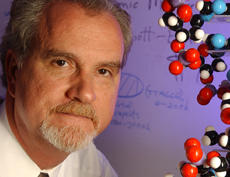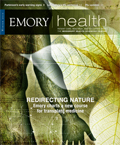Opening access to autism data

Any scientist seeking clues to autism and other developmental disorders will soon have free, on-line access to a central repository of raw (and anonymous) genetic data from more than 200,000 cases.
 Geneticist David Ledbetter wants to have results from clinical genetic testing worldwide continually flowing into the autism database. |
The data to be collected in more than 100 clinical testing laboratories in the United States, Canada, Australia, Asia, and Europe is being made available, thanks to a $3.4 million federal stimulus award to Emory.
Called the International Standard Cytogenomic Array Consortium (ISCA), the new database focuses specifically on copy number variations (CNVs), segments of DNA in which a person 's two chromosomes differ because of deletions or duplications of individual genes or genetic regions. These CNVs can be inherited or caused by mutations later in life. Some are believed to play a role in disease and disorder. But which?
The goal of Emory medical genetics director David Ledbetter (above), principal investigator of the project, is to have results from clinical genetic testing worldwide continually flowing into the new database. He also wants everyone who wants to use the database to have easy access.
In addition to registered scientists, the raw data in the ISCA database will be available to companies developing microarray technology. This technology uses a high-throughput computer to sift through and analyze large chunks of genomic information chemically arrayed on a microchip or tiny glass slide. In less than a decade, this new technology has taken genetic testing from using a microscope to look for large, visible changes on the chromosome (such as the extra chromosome involved in Down syndrome) to examining a person 's entire genome, looking for minute variations in both chromosomes and genes. An aggregate form of data also will be available to clinicians.
The award, from the NIH 's Eunice Kennedy Shriver National Institute of Child Health and Human Development, comes from a special category of federal stimulus money (the American Recovery and Reinvestment awards) focused on "grand opportunities" big ideas that not only provide jobs but also have a major impact on research and medicine.
When the award category was first announced, Ledbetter leaped at the chance to transform a big idea under way at Emory into an international opportunity. Over the past two years, he and director of the Emory cytogenetics laboratory Christa Lese Martin, co-principal investigator, along with other Emory colleagues, have performed high-resolution microarray technology testing on more than 4,000 patients. They also have received and standardized almost four times that many samples from several of the more than 70 laboratories in the consortium. These data are the first to move into the ISCA central database, and the laboratories working with Emory are first in line to provide data on an ongoing basis.
With the grand opportunities grant now in hand, the job now of Ledbetter, Martin, and their collaborators is to expand the number of participating clinical laboratories across the world, standardize data collection, and develop a push-button process with which these laboratories can submit their data.
Ledbetter is excited by ISCA's promise. He 's also proud that, instead of individual groups getting a for-profit, subscriber-only monopoly on the microarray analysis of genomic data as some had tried that the consortium follows the Human Genome Project model, in which all data are freely and publicly available. —Sylvia Wrobel


